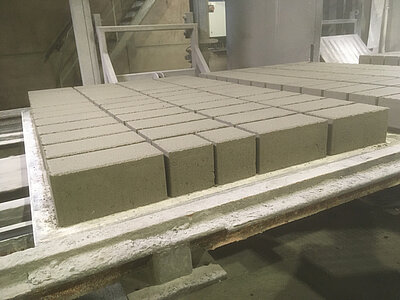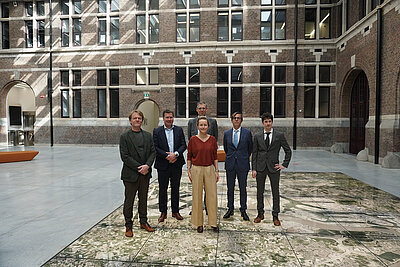Open call for projects within the framework of industrial symbiosis
The call for industrial symbiosis projects supports companies in innovative collaborations and helps them to find ways to use the waste from one of them as a raw material for the other. The open call for projects, which Port of Antwerp launched with its partners in September, asked participants to take up the challenge of proposing a symbiosis project in which at least two different companies, one of which is located in the port area, can exchange materials and thereby make a significant contribution to the circular economy in and around the port of Antwerp. Real business cases with a chance of success were sought out and are thus given a boost.
Indaver/Marlux-Stradus and Dockwater BV convince the jury
An independent jury of experts evaluated the submitted symbiosis projects based on several criteria including environmental impact, scalability, innovative character and the potential to lead to a real investment which will help Flanders to reduce its residual waste or material consumption.
The first project will involve a joint venture between Indaver and Marlux-Stradus in which concrete clinkers will be produced from secondary raw materials. Indaver processes around 450,000 tonnes of household waste or comparable industrial waste annually, which results in approximately 90,000 tonnes of bottom ash remaining.
After processing, 30,000 tonnes of granules remain which can be used as secondary raw material for the concrete clinkers produced by the Marlux-Stradus company. As such, the recovered granules are provided with a high-quality application.
Dockwater BV also convinced the jury with a symbiosis project in which dock water and effluent water from industrial companies in the port (including Evonik and Covestro) are processed into high-quality process water. This allows the industry to reduce its drinking water consumption significantly, thus reducing the pressure on fresh water sources in Flanders, with a positive effect on our drinking water supply. In addition, it will be investigated whether additional surface water can be returned to the docks, which would be beneficial during droughts for maintaining the level of the dock.
Support process
In the next few weeks, both companies will start their support process.
Port of Antwerp will provide a maximum amount of 50,000 EUR per project for analysing and testing the opportunities for symbiosis. The symbiosis companies themselves will contribute 25% of the total cost of the support process. During the project, the companies will be supported by their partners with regard to technical and policy feasibility, among other things. The ultimate goal will involve enabling the companies concerned to take the next step towards the roll-out of industrial symbiosis at company level after the completion of this process.
Port alderman, Annick De Ridder: "The port of Antwerp aspires to be the "green port" of the future. An essential part of this will involve the transition to work processes which rely more on renewable and circular raw materials. This project call of Port of Antwerp, together with experts of the Flemish Symbiosis Team, supported by VITO and OVAM, and essenscia will support companies in innovative collaborations and help them to find ways to use the waste of the one as a raw material for the other. By giving innovative projects and ideas a deserved push, we fulfil our role as a facilitator within the port community."
Danny Wille, General Director at OVAM: "Port of Antwerp is developing as a circular hotspot. OVAM works closely with the Port Authority to meet the complex challenges involved. This initiative encourages companies to keep materials in the cycle so that we are less dependent on raw materials from abroad."
Marcel Leijtens, Sales Director at Marlux: "Performance which ensures sustainability is deeply rooted in our overall business strategy. The use of secondary raw materials in our concrete paving stones makes a significant contribution to the circular economy. Moreover, it provides an answer to the scarce availability of primary raw materials."
Wim Ooms, Plant Manager Indaver Doel: "For Indaver, waste is not the end phase, but a source of new materials. In the circular economy, producers want to reuse raw materials on condition that they are as good and as safe as the original materials. In the ash treatment plant, we create value from residual waste by purifying and sorting the bottom ashes, which are released after thermal processing, into high-quality raw materials. In this project with Marlux-Stradus, we welcome this support in order to test the useful application of granules in the production of clinkers. This is how we can realise our ambition, as a waste disposal company, to help shape the circular economy."
Georg Wagner, Managing Director at Covestro, said: "Covestro's ambition is to be climate neutral by 2035 and at the same time strive to become fully circular. In the future, we will be happy to accommodate the new Dockwater BV installation on our site, which will desalinate dock water for use in our production processes. From the fourth quarter of 2024 onwards, this will save the company 97% of its drinking water. We warmly congratulate Dockwater BV on this award and welcome the fact that it now also supports research into the reuse of purified waste water and cooling water from production as a raw material for process water. As such, we will take further steps together towards full circularity."
Ivan Pelgrims, Managing Director at Evonik Antwerpen NV: "It is a logical step in our sustainability policy to use process water instead of drinking water in our production processes. As such, we will put less pressure on the drinking water supply for the population in times of increasing drought. Sustainability is important to us and this is how we implement opportunities in the market. Hence, also in the optimisation of our (waste) water consumption. Naturally, we would like to congratulate Dockwater BV on winning this symbiosis project, and Evonik Antwerp is happy to submit our effluent, or rather our treated and purified waste water and cooling water, to this study in order to achieve a circular solution."
Mark McComiskey, a board member of Dockwater BV: "Dockwater is grateful for the recognition and the support of Port of Antwerp. Dockwater is committed to working with its customers, the port and other key stakeholders to fulfil the vision of the port and the government to create both a circular water supply by collecting waste water and converting it into industrial process water, and to offer customers a choice of water supplier. Currently industrial companies consume 40% of the drinking water supply in the region. The Dockwater project has the potential to reduce this consumption substantially by reusing industrial waste water, thereby benefiting the environment and water security in the Antwerp region."


